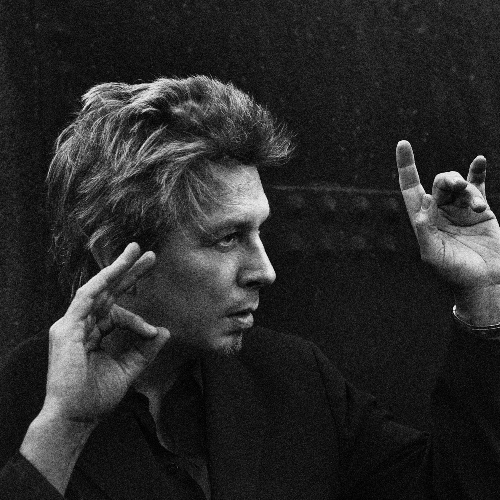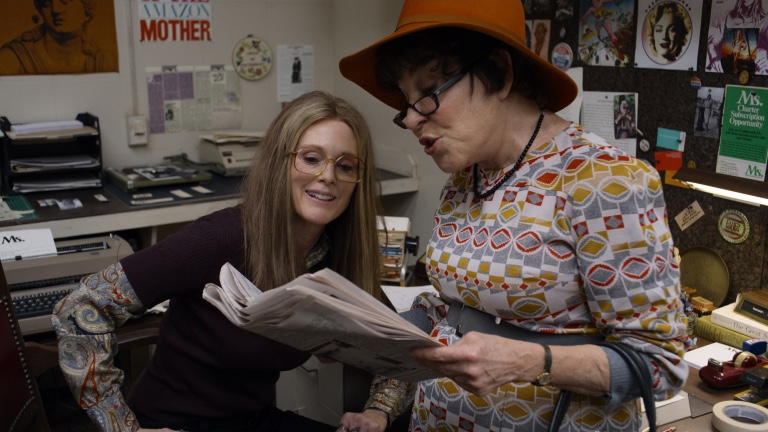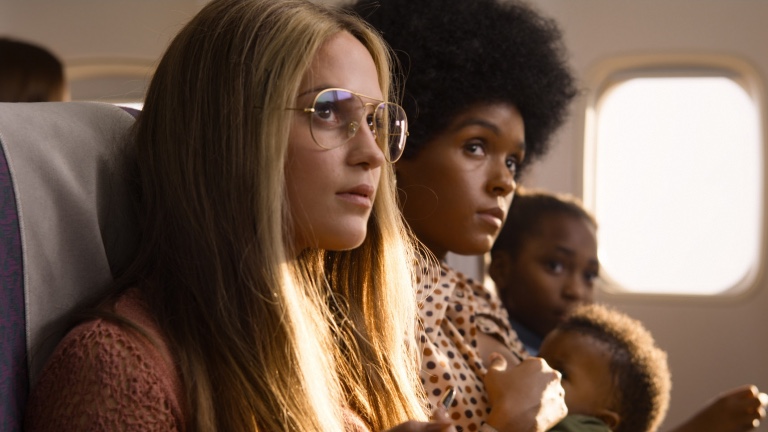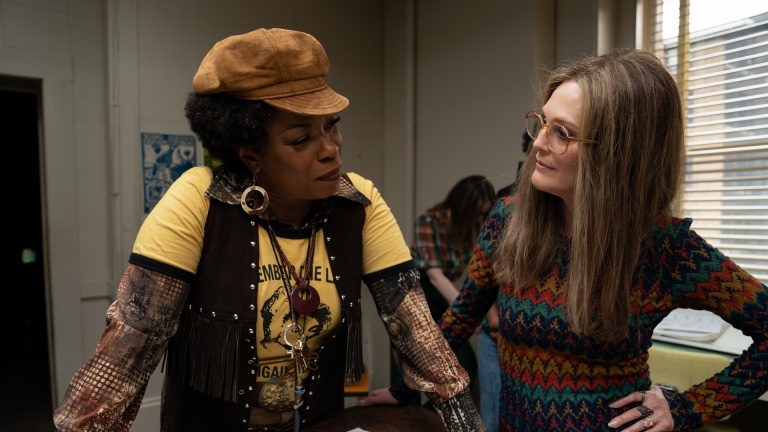
Four different performers (Julianne Moore, Alicia Vikander, Ryan Kiera Armstrong, and Lulu Wilson) portray Gloria Steinem in The Glorias, Julie Taymor‘s biopic about the renowned feminist. For composer Elliot Goldenthal, that meant finding musical themes to tie together a narrative that stretches over two continents and several decades. After premiering at Sundance this past January, The Glorias will be available for digital download and streaming via Prime Video on Wednesday, September 30.
Goldenthal has written scores for over 30 films, including Interview with a Vampire, Heat, and Drugstore Cowboy. Among his many awards are an Oscar and Golden Globe for Frida. His opera Grendel was performed at the Lincoln Center Festival and was a Pulitzer Prize-finalist in 2006. His score for the American Ballet Theatre’s Othello debuted at the Metropolitan Opera.
Speaking by phone from Martha’s Vineyard, Goldenthal told Below the Line that he started work on the score for The Glorias long after filming began.
“I prefer to come in as late as possible,” he said. “Of course I had the script, and I discussed it at length. Every day I saw the dailies come back. But getting a sense of the rhythm and the performances, how the actors interact emotionally, their speech patterns, the dramatic impetus of a scene— all of that has to come in the late stages.”
Goldenthal composed and recorded the score between May and September 2019. (Some of his scores — Alien 3 for example — took as long as eighteen months.) For Frida, which included scenes in which his songs were performed and choreographed live, his material had to be ready early on. The Glorias had few situations involving prerecorded music: A young Gloria dances with her father (Timothy Hutton) to an Andrews Sisters song, and later tap dances in a barber shop to Count Basie.

“In those early sequences, her father buys a jukebox and drives Gloria back to their home in Michigan,” Goldenthal points out. “For that scene, I wanted the feeling of the 1930s or ’40s, so I wrote something reminiscent of the Hot Club of France. The group’s guitarist, Django Reinhardt, was popular for a long stretch, from 1931 to 1949, so I didn’t have to be specific about the exact year.”
The theme made Taymor smile when she heard it, so Goldenthal used the same chord structure six or seven times in the score. One version he slowed down to provide a nostalgic feel, another was arranged for a romantic dance sequence.
“It helps to have that thematic control,” he explained. “By manipulating the orchestration and manipulating the tempo, I can have a cohesion, the same DNA of thematic material, running through the whole movie. Even if the audience doesn’t recognize it on the outset, it still sticks in some subconscious way.”
To bridge the story’s different time periods, Taymor and Cinematographer Rodrigo Prieto developed a method of shooting what they called the “bus out of time.” It was a strategy that allowed all four Glorias to appear in one shot. Each Gloria could view a different period out the windows. The bus out of time was also an opportunity for Goldenthal to introduce a guitar-driven element of his score.
“When the present-day Gloria is looking out the window in the beginning, while the bus goes across South Dakota to the motorcycle rally in Sturgis, I was looking for a kind of Americana sound with a guitar,” Goldenthal said. “Very simple chord changes, like you would find in a hymnal. Nothing fancy. You can feel the big sky, the stretched-out highway. It’s not overly thought-out music, just long chords.”
At the same time, the college-age Gloria is looking out a window into the Indian countryside. “So under those long, sustained chords, I could layer on textures that suggest India. I looked for instruments that are played in both places, like accordions. Indian music often uses a harmonium, or something similar. Those types of things were a challenge, but some of the answers were very simple.”

Goldenthal composes simultaneously while watching the footage. “It’s improvising. And I check myself to see if I’m getting the acting and the dialogue clearly as I’m improvising through it.”
The composer is determined to maintain a balance between his score and the footage.
“I had the good fortune of working on three Shakespeare movies, Titus, The Tempest, and A Midsummer Night’s Dream,” he said. “They’re probably the most extreme case of dense dialogue. You don’t want to get in Shakespeare’s way, or in the way of great actors like Anthony Hopkins and Helen Mirren.
“So that was excellent training for me in how to not interfere with the performance or the dialogue. In other words, I can’t just write a tune and have it play over the material. It has to be modified and sculpted to the scene.”
Occasionally Goldenthal had to adjust the score after scenes were re-edited. He postponed working on a sequence set in the 1977 ERA convention in Houston until the digital effects were added.
“I waited on that until everything was in place, especially in terms of length,” he remembered. “There’s a certain emotional response a composer has once you can actually see the rhythm of the scene. For example, if Bella Abzug (played by Bette Midler) is speaking to a large crowd from the podium, and the point-of-view switches to the audience reaction, sometimes that’s reflected in the music. If the film is building the enthusiasm between the speech and the audience, it helps if the music supports that emotional crescendo.”
In another instance, Taymor persuaded the composer to take a different approach to a sequence in which Steinem and a TV interviewer embark on a Wizard of Oz–like fantasy.
“Musically I started out more serious, almost spooky, as if the TV host were being tortured,” Goldenthal explained. “But I was talked out of it by Julie. She wanted something to be slightly dark and very playful at the same time.”
Instead, Goldenthal went with a tarantella form for the strings, “and a kind of ‘oompah’ in the brass to let people feel the levity, like they were at a circus. Then there’s the second part, a superfast, nervous, gypsy tempo. Underneath that is a sneery brass, trumpet trills. Devilishly cruel, but also playfully sardonic. Gloria’s having fun with the person. She’s not torturing him, she’s playing with him.”
The sequence was written for a full orchestra and was recorded in one day. The rest of the score, including a jazz ensemble, solo piano sessions, and amplified guitar sessions, was recorded over several weeks. Goldenthal singled out guitarist Mark Stewart, who has played on fifteen of his scores.

The Glorias premiered at Sundance in January, just as news of a virus in Wuhan was spreading. Goldenthal, who attended the screening, remembered that “people were very wary, but no one was wearing masks. I felt like I had pneumonia-like symptoms when I came back, so I stayed away from people, sort of quarantined myself.”
The composer finished the album version of The Glorias soundtrack the night before our conversation. His mixing person is in California, the engineer recorded all the takes in New York but is now in New Hampshire, while Goldenthal worked from Martha’s Vineyard.
“I’ve never worked this way before,” he admitted. “I would suggest changes in the mix and get them back later that day to listen to. Then I had to try to describe verbally what I felt about them. The problem is we’re not there in the same room. And that’s a very difficult way to work. In person I can reach over to the console board and tweak something physically. I couldn’t do that this time. I’m happy with the results, but it took a lot of back and forth.”
Goldenthal was commissioned to compose a classical work for orchestra and soprano that was supposed to be performed September in Poland.
“We had to cancel because I couldn’t go to Poland for the rehearsals,” he said. “I don’t know what’s going to happen next year, but the pandemic has stopped my ability to complete the commission. The best thing we have to fight Covid-19 right now is social distancing and masks. We have to all be tolerant with each other, try to obey what are simple recommendations. They’re really simple. When people gather all it takes is one to affect thousands of people.”





